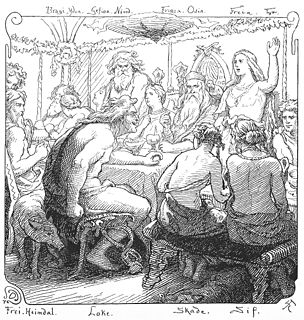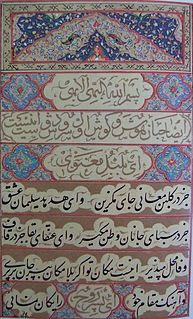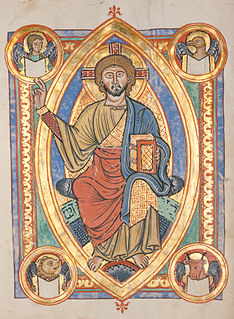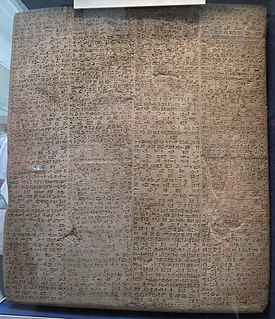
Lokasenna is one of the poems of the Poetic Edda. The poem presents flyting between the gods and Loki. It is written in the ljóðaháttr metre, typical for wisdom verse. Lokasenna is believed to be a 10th-century poem.

An acrostic is a poem or other composition in which the first letter of each line spells out a word, message or the alphabet. The word comes from the French acrostiche from post-classical Latin acrostichis, from Koine Greek ἀκροστιχίς, from Ancient Greek ἄκρος "highest, topmost" and στίχος "verse". As a form of constrained writing, an acrostic can be used as a mnemonic device to aid memory retrieval.
An Act of Contrition is a Christian prayer genre that expresses sorrow for sins. It may be used in a liturgical service or be used privately, especially in connection with an examination of conscience. Special formulae for acts of contrition are in use in the Anglican, Catholic, Lutheran, Methodist and Reformed Churches.

The word thou is a second-person singular pronoun in English. It is now largely archaic, having been replaced in most contexts by the word you. It is used in parts of Northern England and in Scots. Thou is the nominative form; the oblique/objective form is thee, the possessive is thy (adjective) or thine and the reflexive is thyself. When thou is the grammatical subject of a finite verb in the indicative mood, the verb form typically ends in -(e)st, but in some cases just -t.

The Hidden Words is a book written in Baghdad around 1858 by Baháʼu'lláh, the founder of the Baháʼí Faith, while he walked along the banks of the Tigris river during his exile there. The work is written partly in Arabic and partly in Persian.
"Wyoming" is the state song of Wyoming. Judge Charles Edwin Winter (1870–1948) wrote the words during the summer of 1903, and Earle R. Clemens (1878–1943) wrote music to it soon thereafter. They copyrighted the song in 1913 and the Wyoming Publishing Company in Casper published it that same year and the song became the unofficial Wyoming state song. Clemens was a newspaper editor for the Grand Encampment Herald, the newspaper of Grand Encampment, Wyoming.

A Christian child's prayer is Christian prayer recited primarily by children that is typically short, rhyming, or has a memorable tune. It is usually said before bedtime, to give thanks for a meal, or as a nursery rhyme. Many of these prayers are either quotes from the Bible, or set traditional texts.

"Come Again, sweet love doth now invite" is a song by John Dowland. The lyrics are anonymous. The song is bitter-sweet, typical of Dowland who cultivated a melancholy style.
Thanksgiving after Communion is a spiritual practice among Christians who believe in the Real Presence of Jesus Christ in the Communion bread, maintaining themselves in prayer for some time to thank God and especially listening in their hearts for guidance from their Divine guest. This practice was and is highly recommended by saints, theologians, and Doctors of the Church.

Saint Louis de Montfort's Prayer to Jesus is a reflection of his philosophy of "total consecration to Jesus Christ through Mary", a theme that centuries later influenced the development of Roman Catholic Mariology.
"A rose by any other name would smell as sweet" is a popular reference to William Shakespeare's play Romeo and Juliet, in which Juliet seems to argue that it does not matter that Romeo is from her family's rival house of Montague, that is, that he is named "Montague". The reference is often used to imply that the names of things do not affect what they really are. This formulation is, however, a paraphrase of Shakespeare's actual language. Juliet compares Romeo to a rose saying that if he were not named Romeo he would still be handsome and be Juliet's love. This states that if he were not Romeo, then he would not be a Montague and she would be able to marry him without hindrance.

Psalm 31 is the 31st psalm of the Book of Psalms, beginning in English in the King James Version: "In thee, O LORD, do I put my trust". In Latin, it is known as "In te Domine speravi". The Book of Psalms is part of the third section of the Hebrew Bible, and a book of the Christian Old Testament. In the slightly different numbering system used in the Greek Septuagint version of the Bible, and in its Latin translation, the Vulgate, this psalm is Psalm 30. The first verse in the Hebrew text indicates that it was composed by David.

Psalm 71 is the 71st psalm of the Book of Psalms, beginning in English in the King James Version: "In thee, O LORD, do I put my trust: let me never be put to confusion". In the Greek Septuagint version of the Bible, and in the Latin Vulgate, this psalm is Psalm 70 in a slightly different numbering system. In Latin, it is known as "In te Domine speravi".

Spiritual communion is a Christian practice of desiring union with Jesus Christ in the Eucharist. It is used as a preparation for Mass and by individuals who cannot receive Holy Communion.

Torquil MacNeill was a mid sixteenth century clan chief.

Kumayl bin Ziyad an-Nakha'i was among the most loyal companions of Imam Ali Ibn Abi Talib. Moreover, Kumayl occupies a prominent position in Shia Islam. Converting to Islam during the time of Islamic prophet Muhammad, he rose to a position of prominence during the caliphates of Uthman and Ali. In the caliphate of Ali, Kumayl flourished and served him in the most disciplined of ways. However, he is recognized for his pious and humble nature as well as preserving Imam Ali's teachings. Kumayl is best known for the du'a (supplication) of Prophet Khidr, which is commonly known by the name du'a Kumayl.
"The Merry Month of May" is a poem by Thomas Dekker, an English Elizabethan dramatist and pamphleteer. "The Merry Month of May" is a part of Dekker's play, The Shoemaker's Holiday, first performed in 1599. In Ernest Rhys's 1887 publication of Dekker's work, he title the poem The First Three-Men's Song.

"Welcome and Farewell" is a poem by Johann Wolfgang von Goethe from the collection Sesenheimer Lieder. It was published for the first time in 1775 in the women's magazine Iris. Franz Schubert set it to music as a lied (D.767).

The East India House Inscription is an important foundation tablet from ancient Babylon. Since 1938, it has been a major artifact in the British Museum's Middle East collection.
The King of Love My Shepherd Is is an 1868 hymn with lyrics written by Henry Baker, based on the Welsh version of Psalm 23 and the work of Edmund Prys. It is sung to four different melodies: Dominus Regit Me, the traditional Irish tune St. Columba, "Ich dank' dir schon" by Michael Praetorius, and Remsen, the Welsh original. Henry Baker's last words were reportedly lyrics from this hymn. In 1997, the hymn was sung at the funeral of Diana, Princess of Wales.













